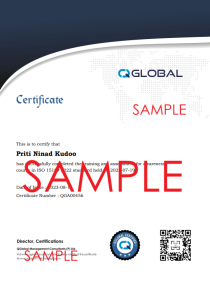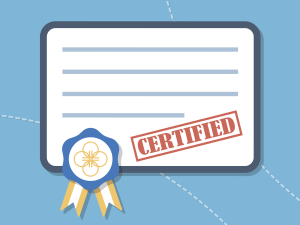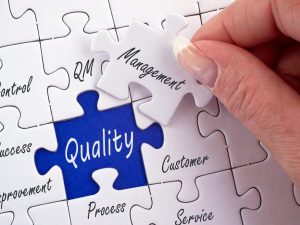HACCP Hazard Analysis & Critical Control Points – Internal Auditor Course (Level 3)
- Description
- Curriculum

The HACCP system, which is science based and systematic, identifies specific hazards and measures for their control to ensure the safety of food. HACCP is a tool to assess hazards and establish control systems that focus on prevention rather than relying mainly on end-product testing. Any HACCP system is capable of accommodating change, such as advances in equipment design, processing procedures or technological developments. HACCP can be applied throughout the food chain from primary production to final consumption and its implementation should be guided by scientific evidence of risks to human health. As well as enhancing food safety, implementation of HACCP can provide other significant benefits. In addition, the application of HACCP systems can aid inspection by regulatory authorities and promote international trade by increasing confidence in food safety. The successful application of HACCP requires the full commitment and involvement of management and the work force. It also requires a multidisciplinary approach HACCP internal auditor course will help you learn how to initiate an audit, prepare and conduct audit activities, compile and distribute audit reports and complete follow-up activities. On successful completion of this course, you will be able to optimize your auditing skills with the internationally recognized HACCP standard and boost your audit capabilities. Also gain confidence in planning and performing an effective audit, as well as reporting and taking corrective action where necessary. HACCP internal auditor training course develops the necessary skills to assess and report on the conformance and implementation of processes based on HACCP.
Who Should Attend?
- Anyone involved in the planning, implementing, maintaining, supervising or auditing of an HACCP food safety management system
- Those who like to handle the role of an HACCP internal auditor in an organisation
- Employees of any organisation who wish to audit their organisation’s food safety management system
- Those involved in second party audits such as vendor audits
- Personnel who wish to pursue career as an HACCP internal auditor
- Expert advisors in food safety management
Key Benefits
- Gain the skills to plan, conduct, report and follow up first and second party audits in accordance with ISO 19011
- Learn skills to lead an internal audit team
- Identify the aims and benefits of an HACCP audit
- Interpret HACCP requirements for audit application
- Grasp the application of risk-based thinking, leadership and process management
- Acknowledge the correlation between HACCP and other standards and regulatory frameworks
- Learn the latest techniques in HACCP internal auditing
- Consolidate your expertise with the latest developments and contribute to the continuous improvement of the business
Learning & Evaluation Method
This is a live and interactive course. Once you purchase the course, our team will contact you to plan the training. No matter where you are located, we schedule the classes based on your convenience and time zone. You can plan to attend the training in sessions of 4 or 8 hr duration, based on how much time you can spend in a day.
Certification
There are increasing numbers of organizations, who prefer candidates those who have certain certifications from recognized programs. Certification demonstrates your commitment to superior professionalism, upholding industry standards, and continued learning. These merits can help boost your professional credibility and prestige within your own network, in your organisation, with your current clients, and when pursuing new business opportunities. After the successful completion of the course and final exam, you will be awarded with a certificate of completion issued by QGlobal. Your credentials will be made available in the global online directory and can be verified by anyone searching with the certificate number. Without doubt we can say that our training courses are well recognized and sought after by organizations across various geographies.
Buy for group Are you planning to buy this course for a group? We have the best prices for you! Select ‘Buy for Group’ option and add to the cart. You will get a discount of 60 – 75% for a group of up to 10 participants. To make a group purchase, create your group name and add individual emails of up to 10 participants. Each participant will get the access to the course materials, exam and the certificate. We will arrange one live-online session for the entire group.
Total: 206 Courses View all
Total: 206 Courses View all
-
1Introduction to food safety standards and practices
-
2Introduction to Hazard Analysis and Critical Control Points (HACCP)
-
3Components of HACCP system
-
4Prerequisite program requirements (PRPs)
- Examples of hazards controlled by implementing PRPs
-
5PRPs from ISO 22002-1 2019 standards
- ISO 22002-1:2009 Prerequisite programmes on food safety -- Part 1: Food manufacturing
- ISO/TS 22002-2:2013 Prerequisite programmes on food safety -- Part 2: Catering
- ISO/TS 22002-3:2011 Prerequisite programmes on food safety -- Part 3: Farming
- ISO/TS 22002-4:2013 Prerequisite programmes on food safety -- Part 4: Food packaging manufacturing
- ISO/NP TS 22002-5
- ISO/TS 22002-6:2016 Prerequisite programmes on food safety -- Part 6: Feed and animal food production
-
6PRP 01 – Food defense – biovigilence and bioterrorism
Controls for food defence
-
7PRP 02 – Product recall procedures
-
8PRP 03 - Rework
-
9PRP 04 – Training and supervision
-
10PRP 05 – Measures for prevention of cross contamination
-
11PRP 06 – Traceability
-
12PRP 07 – Storage and warehousing
-
13PRP 08 – Utilities – air, water, energy
-
14PRP 09 – Personal hygiene and employee facilities
-
15PRP 10 – Cleaning and sanitizing
-
16PRP 11 – Pest control
-
17PRP 12 – Waste disposal
-
18PRP 13 – Management of purchased material
-
19PRP 14 – Layout of premises and workspace
-
20PRP 15 – Equipment suitability, cleaning and maintenance
-
21PRP 16 – Construction and layout of building
-
22HACCP – HACCP plan
-
23HACCP Principles
-
24Regulatory requirements for food businesses
-
25Introduction to ISO 19011 2018 Guidelines for auditing management systems
- Scope
- Normative references
- Terms and definitions
-
26ISO 19011 Principles of auditing
-
27ISO 19011 Managing an audit program
- Establishing audit programme objectives
- Determining and evaluating audit programme risks and opportunities
- Establishing the audit programme
- Roles and responsibilities of the individual(s) managing the audit programme
- Competence of individual(s) managing audit programme
- Establishing extent of audit programme
- Determining audit programme resources
- Implementing audit programme
- Defining the objectives, scope and criteria for an individual audit
- Selecting and determining audit methods
- Selecting audit team members
- Assigning responsibility for an individual audit to the audit team leader
- Managing audit programme results
- Managing and maintaining audit programme records
- Monitoring audit programme
- Reviewing and improving audit programme
-
28ISO 19011 Conducting an audit
- Initiating audit
- Establishing contact with auditee
- Determining feasibility of audit
- Preparing audit activities
- Performing review of documented information
- Audit planning
- Assigning work to audit team
- Preparing documented information for audit
- Conducting audit activities
- Assigning roles and responsibilities of guides and observers
- Conducting opening meeting
- Communicating during audit
- Audit information availability and access
- Reviewing documented information while conducting audit
- Collecting and verifying information
- Generating audit findings
- Determining audit conclusions
- Conducting closing meeting
- Preparing and distributing audit report
- Preparing audit report
- Distributing audit report
- Completing audit
- Conducting audit follow-up
-
29ISO 19011 Competence and evaluation of auditors
- Determining auditor competence
- Personal behavior
- Knowledge and skills
- Achieving auditor competence
- Achieving audit team leader competence
- Establishing auditor evaluation criteria
- Selecting appropriate auditor evaluation method
- Conducting auditor evaluation
- Maintaining and improving auditor competence
-
30ISO 19011 Auditor training practice questions
-
31Practice Questions – HACCP auditor training
Exam duration is 60 minutes. There are total 40 questions in this exam. All questions carry 1 mark each. Select only the most appropriate answer. Minimum pass mark is 50%. You have 3 attempts to pass the exam.






















































